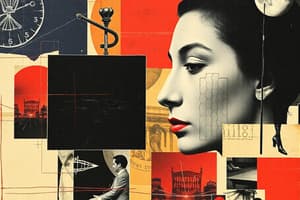Podcast
Questions and Answers
Curriculum is a set of subjects, a content, a program of studies, and a sequence of ______.
Curriculum is a set of subjects, a content, a program of studies, and a sequence of ______.
courses
The recommended curriculum is suggested by national agencies or professional ______.
The recommended curriculum is suggested by national agencies or professional ______.
organizations
The taught curriculum varies according to the learning styles of students and the ______ styles of teachers.
The taught curriculum varies according to the learning styles of students and the ______ styles of teachers.
teaching
Supported curriculum refers to material resources that aid in curriculum ______.
Supported curriculum refers to material resources that aid in curriculum ______.
Curriculum development involves selecting, organizing, executing, and evaluating learning ______.
Curriculum development involves selecting, organizing, executing, and evaluating learning ______.
Basic education emphasizes the three R’s: reading, writing, and ______.
Basic education emphasizes the three R’s: reading, writing, and ______.
The written curriculum comprises official documents, syllabi, and course studies created by curriculum ______.
The written curriculum comprises official documents, syllabi, and course studies created by curriculum ______.
A traditional point of view on curriculum emphasizes a body of subjects prepared by ______ for student learning.
A traditional point of view on curriculum emphasizes a body of subjects prepared by ______ for student learning.
The concept approach involves integration around major and sub-concepts and their ______.
The concept approach involves integration around major and sub-concepts and their ______.
Thematic approach focuses on developing conceptual ______.
Thematic approach focuses on developing conceptual ______.
Curriculum as a process emphasizes critical thinking, meaning making, and hands-on ______.
Curriculum as a process emphasizes critical thinking, meaning making, and hands-on ______.
Philosophical foundation guides questions and prescribes a way of ______.
Philosophical foundation guides questions and prescribes a way of ______.
Teaching methods are seen as means to an ______.
Teaching methods are seen as means to an ______.
Flexibility in the use of ______ is essential for effective teaching and learning.
Flexibility in the use of ______ is essential for effective teaching and learning.
One of the major educational philosophies is ______, which means everlasting or constant.
One of the major educational philosophies is ______, which means everlasting or constant.
Curriculum as a product equips students with ______ to function effectively.
Curriculum as a product equips students with ______ to function effectively.
The real purpose of education is to bring about significant changes in the students’ pattern of ______.
The real purpose of education is to bring about significant changes in the students’ pattern of ______.
Essentialism advocates instilling in students the 'essentials' or 'basics' of academic knowledge and ______.
Essentialism advocates instilling in students the 'essentials' or 'basics' of academic knowledge and ______.
Progressivism believes that children should learn as if they were ______ using scientific method.
Progressivism believes that children should learn as if they were ______ using scientific method.
Reconstructionism argues that students must be taught how to bring about ______.
Reconstructionism argues that students must be taught how to bring about ______.
Classical Conditioning was demonstrated by ______ with his experiments on dogs.
Classical Conditioning was demonstrated by ______ with his experiments on dogs.
Burrhus Frederic Skinner is known for his work on ______ Conditioning.
Burrhus Frederic Skinner is known for his work on ______ Conditioning.
______ and observation theory states that people learn by observing how others behave.
______ and observation theory states that people learn by observing how others behave.
Positive and Negative ______ are concepts in operant conditioning that affect behavior outcomes.
Positive and Negative ______ are concepts in operant conditioning that affect behavior outcomes.
The Department of Education, Culture, and Sports was established to address more complex and ______ societies.
The Department of Education, Culture, and Sports was established to address more complex and ______ societies.
Bilingual education was required and reiterated in the 1987 ______.
Bilingual education was required and reiterated in the 1987 ______.
RA 7722 led to the creation of the Commission on Higher ______ Education.
RA 7722 led to the creation of the Commission on Higher ______ Education.
One of the aims of education is to develop socially efficient ______.
One of the aims of education is to develop socially efficient ______.
The 1987 Constitution guarantees the right to quality education and assigns the highest ______ priority to education.
The 1987 Constitution guarantees the right to quality education and assigns the highest ______ priority to education.
Education was used to pacify ______.
Education was used to pacify ______.
The Educational Decree of 1863 mandated the establishment of free primary schools in each ______.
The Educational Decree of 1863 mandated the establishment of free primary schools in each ______.
Teaching methods included catechetical instruction, corporal punishment, and ______.
Teaching methods included catechetical instruction, corporal punishment, and ______.
The Philippine Normal School was established to train aspiring ______.
The Philippine Normal School was established to train aspiring ______.
Outstanding Filipino scholars were given the opportunity to study in the United ______.
Outstanding Filipino scholars were given the opportunity to study in the United ______.
Problems in education included inadequate instructional ______ materials.
Problems in education included inadequate instructional ______ materials.
Free and compulsory primary education was established during the Philippine ______ Period.
Free and compulsory primary education was established during the Philippine ______ Period.
The Taft Commission Act No. 74 established the Philippine ______ School System.
The Taft Commission Act No. 74 established the Philippine ______ School System.
Study Notes
Curriculum Definitions
- Traditional Perspective: A structured set of subjects established by teachers for student learning.
- Curriculum Development Process: Involves selecting, organizing, executing, and evaluating student learning experiences.
- Factors Affecting Curriculum Development:
- The needs, abilities, and interests of learners.
- The characteristics of society.
- Written Curriculum: Formal documents, syllabi, and course outlines created by curriculum experts.
- Taught Curriculum: Planned classroom activities designed to achieve the objectives outlined in the written curriculum.
- Supported Curriculum: Material resources like textbooks, technology, and laboratory equipment that facilitate curriculum implementation.
Curriculum as a Process
- Classroom Learning: The teacher utilizes the content to achieve specific learning outcomes.
- Teaching and Learning: Teachers prioritize critical thinking, meaning-making, and hands-on experiences.
- Process-Based Approach: Focuses on how content is taught, emphasizing instruction, implementation, and teaching strategies.
- Key Principles:
- Teaching methods are tools for achieving specific goals.
- There is no single best teaching method.
- Curriculum should stimulate learners' desire to develop cognitively, affectively, and psychomotorically.
- Curriculum should accommodate different learning and teaching styles.
- Curriculum should result in measurable learning outcomes.
- Curriculum should be flexible and adapt to the needs of learners.
- The processes of learning and teaching are vital.
Curriculum as a Product
- Essential Outcome: Equip students with the knowledge, skills, and abilities to function effectively and efficiently.
- Behavioral Change: The aim of education is to induce significant shifts in students' behaviors.
- Emphasis on Behavioral Objectives: Curriculum development involves formulating clear ILOs or desired outcomes.
Philosophical Foundations of Curriculum
- Guiding Principles: Provide a framework for educators to understand the purpose of education and shape their approach to curriculum.
- Key Questions
- The purpose of education.
- How students should learn.
- What materials and methods are most effective.
- The importance of teaching and learning processes.
- The role of values and beliefs in the curriculum.
- Major Educational Philosophies
- Perennialism: Emphasizes enduring ideas and values that have stood the test of time.
- Essentialism: Focuses on the "essentials" of academic knowledge and character development, emphasizing traditional values.
- Progressivism: Believes in hands-on experiences, student-centered learning, and relevance to current society.
- Reconstructionism: Advocates for critical thinking and social action to address social injustices.
Psychological Foundations of Curriculum
- Influence on Teaching and Learning: Provides insights into how students learn and process information.
- Key Figures
- Jean Piaget: Cognitive development theory, emphasizing stages of learning.
- Lev Vygotsky: Sociocultural theory emphasizing social interactions in learning.
- Ivan Pavlov: Classical conditioning, association of stimuli with responses.
- Burrhus Frederic Skinner: Operant conditioning, reinforcement to modify behavior.
- Albert Bandura: Social learning theory, observational learning and modeling.
Socio-Historical Foundations of Curriculum
- Historical Influences on Education: The evolution of education has been shaped by cultural norms, social changes, and political events.
- Early Colonial Period: Education was limited to Spanish students and focused on religious instruction and Spanish language skills.
- Philippine Revolutionary Period: Free and compulsory primary education was established.
- American Occupation: American teachers introduced democratic values, progress, and the importance of play in education.
- Japanese Occupation: Education aimed to integrate the Philippines into the East-Asia Co-Prosperity Sphere.
- Post-1986: Bilingual policy, higher education reforms, and strengthening of technical education.
- Key Considerations for Curriculum Development:
- Transmission of culture.
- Addressing social problems.
- Responding to economic challenges.
Legal Foundations of Curriculum
- Constitutional Provisions: The 1987 Philippine Constitution guarantees the right to quality education and prioritizes education funding.
Studying That Suits You
Use AI to generate personalized quizzes and flashcards to suit your learning preferences.
Related Documents
Description
This quiz explores various aspects of curriculum development, including traditional perspectives, the written and taught curriculum, and factors affecting curriculum planning. Gain insights into how educational frameworks are structured to enhance student learning experiences.




